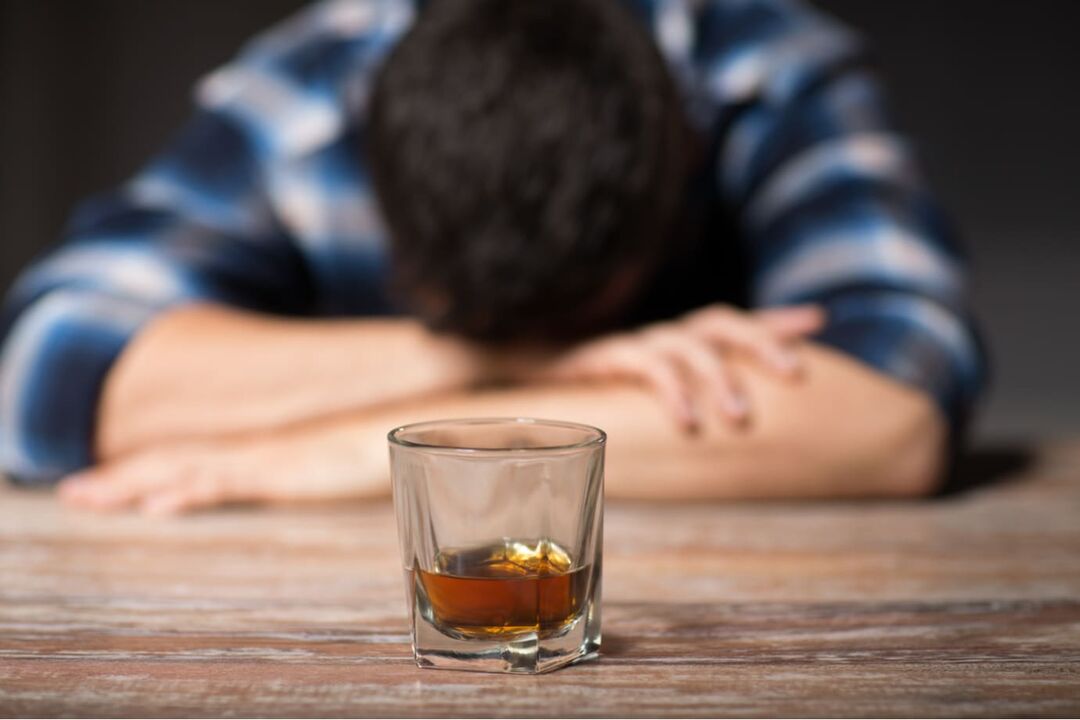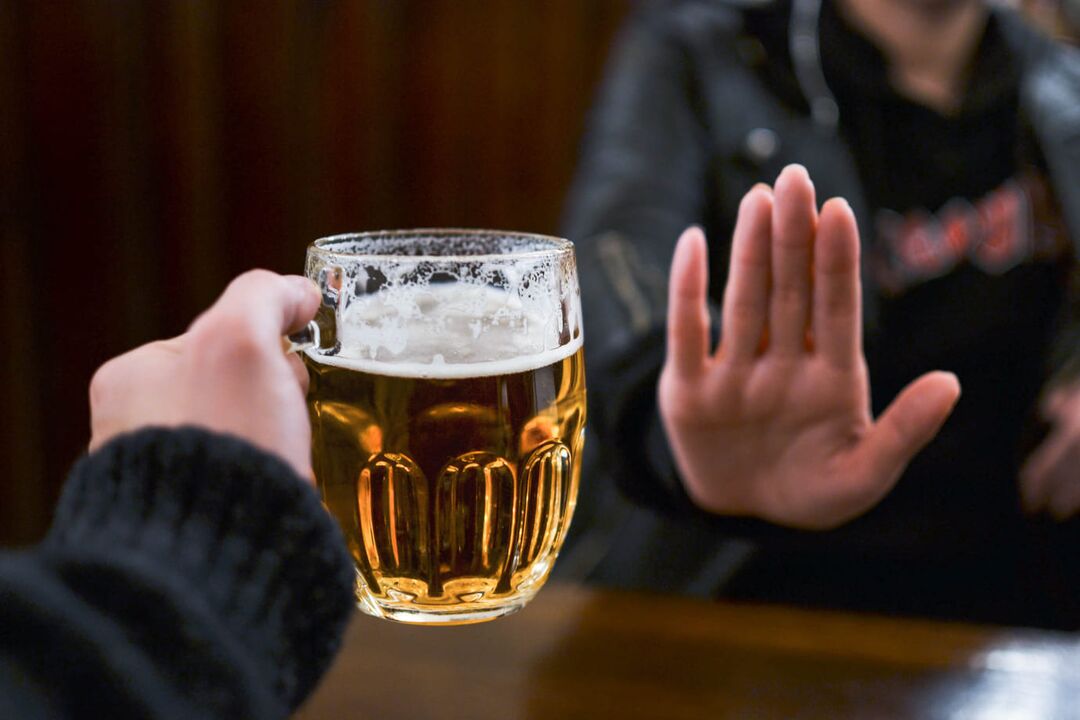Is it possible to stop drinking abruptly - certainly, especially with a firm decision to give up daily alcohol consumption? Yes, it won't be easy, but the "pluses" of a healthy lifestyle will be assessed much faster. Narcologists liken the gradual decrease in the amount of alcoholic beverages to the partial cutting off of the tail. At a certain stage, a person who drinks regularly can simply tear himself away. In order not to start over, it is advisable to endure a temporary deterioration in well-being.
Abrupt refusal to drink alcohol - interesting reactions from the body
Alcoholism is both physical and psychological dependence on ethyl alcohol. Therefore, when it suddenly stops penetrating the body, it is followed by an immediate reaction from almost all vital systems. Unsurprisingly, they now have to work in a modified mode. But do not pay attention to the temporary deterioration in health, since "friendship" with ethanol is expensive for the body. Here are the expected consequences of quitting alcohol in the first few days:
- Weight loss by suppressing appetite;
- Insomnia followed by drowsiness;
- dull migraine-type headache;
- psychoemotional instability - irritability, baseless fear, apathy;
- slight wandering joint pain, trembling of fingers.
It sounds intimidating, but these withdrawal symptoms are more common in older alcoholics. If a person uses a little, but every day, the physical condition practically does not deteriorate. There are only psychological complaints without the usual bottle of beer, a glass of wine or 50-100 grams of vodka.
What are the reasons for such a violent reaction of the body to a sharp refusal to drink? The fact is that ethanol is built into biochemical reactions and becomes their equal participant. If you try to remove it from there, a temporary flaw will appear in the body. Now he has to establish nerve regulation, get the production of the optimal amount of digestive enzymes under control and restore damaged liver and urinary organs. He completes these tasks in about 1-1. 5 months.

Typical signs of alcohol withdrawal
How to give up alcohol forever - full mobilization of willpower is necessary only with systematic domestic drunkenness. In such cases, a person drinks a lot, often constantly experiencing all the "joys" of a hangover. After having problems with his psyche, heart and liver during the next attack, he makes a firm decision to "stop". What is in store for the alcoholic:
- 1 day. Withdrawal symptoms manifest themselves immediately in nausea and vomiting, headache, severe tremors and of course an unbearable hungover craving. In fact, the first day of sobriety becomes an alcoholic's strength test. If he can go without alcohol, his chances of defeating the addiction skyrocket;
- 2-7 days. During this period, the alcoholic feels bad - the body needs the usual amount of alcohol and punishes the "owner" with a headache, visual and acoustic hallucinations, tremors of the arms and legs. Digestion and peristalsis are upset, and the prospects for a healthy lifestyle don't seem so good to the alcoholic. Do not give up at this stage, medication and sleep will help you go to the end.
- Day 8. To make things a little easier, the improvements are visible to the naked eye. The severity of the withdrawal syndrome decreases, the body adapts well to the changed living conditions. Now he is engaged in the restoration of organs and tissues and is learning to work completely without ethanol. Headaches, nausea, and irritability decrease because ethyl alcohol and its toxic metabolites no longer circulate in the blood.
- 30-40 days. That's all - now a person can give advice on how to give up alcohol on his own. Ease appears in the body, physical and mental performance improves, and seemingly lost professional skills return. All vital systems work perfectly, the body works like a clock. But you shouldn't relax - even a sip of beer during this time can break you down.
And now a little fly in the ointment. When a person drank a lot and often, their internal organs were constantly exposed to ethanol. In a poisoning state, the cells were destroyed with no subsequent recovery. Chronic diseases developed, of which the alcoholic did not even suspect. After all, he suppressed all alarming symptoms with another serving of alcohol. But outside of the state of euphoria it will not be possible not to notice it. It's time for a full medical exam. After the diagnosis, the doctor draws up a competent regimen of therapy and prescribes drugs.
The sad consequences of a long alcoholic experience are fat loss of the liver, hepatitis, nephrosis, atrophic gastritis or high acidity. All pathologies are severe, but completely curable, so the prognosis is favorable. Sharp rejection of alcohol sometimes avoids disability and even death. Eventually, as the alcoholic tries to "stop" by lowering the dose, dangerous diseases will develop in his body, which will progress and recur.

We will help you in any way we can - advice for those who choose to "tie" quickly
The decision to stop drinking is often made spontaneously when a person suddenly realizes that a stroke, heart attack, or cirrhosis is just around the corner. Therefore, he does not have time to prepare for the upcoming alcohol withdrawal after a seizure. Unlike relatives, family members can quickly find all the information they need. A person needs help to stop drinking at a difficult stage in life, support, and replace a shoulder.
A breakdown is more than real in the first two weeks, so it makes sense to see a doctor. The transition to a sober lifestyle becomes easier with pharmacological assistance. Parenteral administration of saline solutions, B vitamins, sedatives and anticonvulsants, respiratory analeptics, antiarrhythmics and nootropics will help. The results of medical intervention are obvious:
- Cardiac activity and breathing are normalized;
- Sleep and appetite are restored;
- Nausea and vomiting stop after the next meal.
How to stop drinking abruptly - just by combining willpower, medication and psychological support. The latter is very important as the state of the central nervous system changes dramatically. As long as they get used to working without ethanol, the person who overcomes the addiction will suffer from hallucinations. He discusses with imaginary conversation partners, withdraws for a few hours and even sings. It is not worth paying attention to - the psyche recovers after the evacuation of harmful substances from the body.
Correct rehabilitation - learning to live anew
How to give up alcohol altogether is a burning question. Narcologists note that with a person's active desire to refuse to drink alcohol, the likelihood of long-term remission increases significantly. When an alcoholic makes an important decision to stop drinking, he must understand that now anything that contains ethanol is strictly prohibited.
It is difficult to part with alcohol forever without preparation. Now that you have overcome the toughest early days of withdrawal symptoms, you need to find additional resources to help alleviate the physical and mental state:
- Eliminate fatty and fried foods, foods saturated with salt and spices from the usual diet.
- Walk in the fresh air for 1-2 hours at least once a day.
- They will return to their old hobbies, those who showed an interest in immersing themselves in unbridled drunkenness.
The transition to a sober lifestyle is gradual. A person often falls into despair, only sees the future in black. And then he pulls himself together, persuaded not to give up, takes part again in solving family problems. Narcologists advise using physical activity to speed recovery. You don't have to go straight to the gym or walk long distances. Gentle physical therapy is a great way to recover quickly.

































